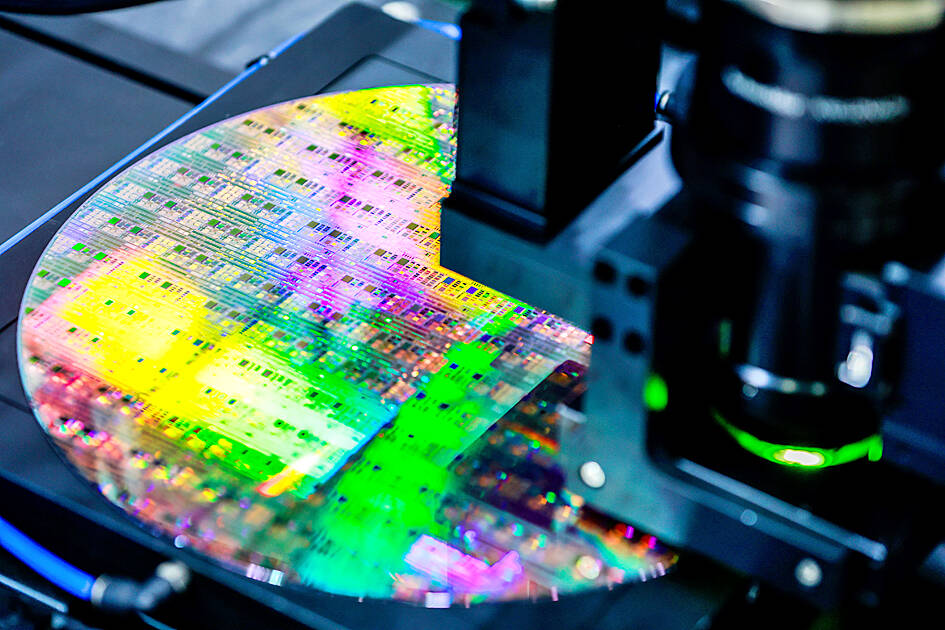Taiwan has imposed restrictions on the export of chips to South Africa over national security concerns, taking the unusual step of using its dominance of chip markets to pressure a country that is closely allied with China.
Taiwan requires preapproval for the bulk of chips sold to the African nation, the International Trade Administration said in a statement.
The decision emerged after Pretoria tried to downgrade Taipei’s representative office and force its move to Johannesburg from Pretoria, the Ministry of Foreign Affairs has said.

Tongo, EPA
The move reflects Taiwan’s economic clout and a growing frustration with getting sidelined by Beijing in the diplomatic community.
Taiwan Semiconductor Manufacturing Co (台積電) makes the majority of the world’s most sophisticated chips, essential to vehicles, artificial intelligence and industrial production.
Official data from Taiwan show that last year the country exported to South Africa roughly US$4 million worth of the semiconductor-related goods that were included in the export suspension list.
South Africa started asking Taiwan to relocate its de facto embassy to Johannesburg from the administrative capital of Pretoria in 2023 after it hosted a BRICS summit that Chinese President Xi Jinping (習近平) attended, a ministry official in Taipei previously told Bloomberg News.
South Africa is now ramping up that request as the country prepares to host the G20 leaders’ meeting in November that Xi is also expected to attend.
Pretoria severed diplomatic ties with Taiwan in 1997.
“The South African government’s actions have undermined our national and public security,” the International Trade Administration said in a statement. “We are adopting measures to restrict trade to maintain our sovereignty.”
The Ministry of Economic Affairs yesterday said it is amending regulations covering exports from free trade ports so that 47 designated products, including chips, bound for South Africa must first obtain ministry approval.
Additional reporting by CNA

NEW IDENTITY: Known for its software, India has expanded into hardware, with its semiconductor industry growing from US$38bn in 2023 to US$45bn to US$50bn India on Saturday inaugurated its first semiconductor assembly and test facility, a milestone in the government’s push to reduce dependence on foreign chipmakers and stake a claim in a sector dominated by China. Indian Prime Minister Narendra Modi opened US firm Micron Technology Inc’s semiconductor assembly, test and packaging unit in his home state of Gujarat, hailing the “dawn of a new era” for India’s technology ambitions. “When young Indians look back in the future, they will see this decade as the turning point in our tech future,” Modi told the event, which was broadcast on his YouTube channel. The plant would convert

‘SEISMIC SHIFT’: The researcher forecast there would be about 1.1 billion mobile shipments this year, down from 1.26 billion the prior year and erasing years of gains The global smartphone market is expected to contract 12.9 percent this year due to the unprecedented memorychip shortage, marking “a crisis like no other,” researcher International Data Corp (IDC) said. The new forecast, a dramatic revision down from earlier estimates, gives the latest accounting of the ongoing memory crunch that is affecting every corner of the electronics industry. The demand for advanced memory to power artificial intelligence (AI) tasks has drained global supply until well into next year and jeopardizes the business model of many smartphone makers. IDC forecast about 1.1 billion mobile shipments this year, down from 1.26 billion the prior

People stand in a Pokemon store in Tokyo on Thursday. One of the world highest-grossing franchises is celebrated its 30th anniversary yesterday.

Zimbabwe’s ban on raw lithium exports is forcing Chinese miners to rethink their strategy, speeding up plans to process the metal locally instead of shipping it to China’s vast rechargeable battery industry. The country is Africa’s largest lithium producer and has one of the world’s largest reserves, according to the US Geological Survey (USGS). Zimbabwe already banned the export of lithium ore in 2022 and last year announced it would halt exports of lithium concentrates from January next year. However, on Wednesday it imposed the ban with immediate effect, leaving unclear what the lithium mining sector would do in the